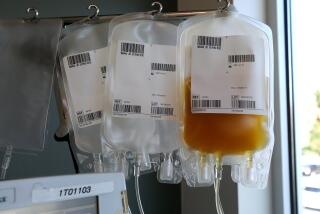Blood Services at HemaCare Attract AIDS Speculation
Why does an obscure little company with a history as a financial bleeder see its stock rise from $1.50 a share in December to a high of $6 on Feb. 18, only to subside to $2.625 Monday?
In the case of HemaCare, a Sherman Oaks blood-services concern, the answer is AIDS, and never mind that just 5% of the company’s revenue comes from businesses even remotely related to the disease.
HemaCare is an example of how the stock market reflects society’s increasing concern with acquired immune deficiency syndrome. It also shows how the market exaggerates those concerns, in this case bidding up AIDS stocks to dizzying heights.
“I don’t think there’s any question the market has overreacted,” said James D. McCamant, editor of Medical Technology Stock Letter. “It’s going to be in waves, but it’s not going to go away, because the AIDS thing is not going to go away.”
Profits Remain Uneven
For all its promise, HemaCare lost $291,000 last year on sales of $3 million. It did earn $48,000 in 1985 on $2.4 million in sales, but lost $237,000 in 1984. Its main businesses are selling platelets and providing mobile hemapheresis, a blood-cleansing therapy for patients with lupus, multiple sclerosis and other disorders.
But the company is believed to be the only for-profit firm in Southern California offering “autologous” blood storage. Individuals can go to HemaCare and set aside their own blood, or that of friends or relatives, for anticipated surgery, thus avoiding the threat of AIDS-contaminated transfusions.
Company chairman Thomas M. Asher doesn’t push the AIDS angle. Nevertheless, HemaCare was swept up in the recent rush to AIDS stocks, along with condom makers and research firms. Some issues have risen as much as 500% this year, said Kenneth S. Abramowitz, an analyst at the Sanford C. Bernstein securities firm.
Despite all the attention AIDS has focused on HemaCare, less than 5% of its revenue comes from autologous-blood banking. And there is hardly a mad dash among consumers to use its service.
Although HemaCare will freeze your blood for years--in case you’re worried about an unforeseen need arising--the company has less than 100 units frozen for such donors. One reason is the cost: $300 a unit. Each unit is about a pint. And, in emergency surgery, three units or more could be required.
But HemaCare has seen growth in its short-term storage of blood donated for patients facing surgery. Freezing in such cases isn’t necessary. HemaCare takes in about 200 units a month from such donors, charging $125 a unit for self-donated blood and $155 for donations from others, Asher said.
“This has happened without our marketing,” he said, explaining that the company didn’t want to complicate its recent relocation by taking in more blood. Now, however, HemaCare plans more marketing.
Even the American Red Cross thinks it is a good idea for patients facing surgery to set aside some of their own blood.
Ironically, the Red Cross says, new tests have made the blood supply virtually AIDS free. A more common problem is non-A, non-B hepatitis, a liver ailment. There is no test for detecting contamination of blood with this infection.
Companies engaging in autologous blood-banking face increased competition. The Red Cross itself, with a doctor’s prescription, will store a patient’s blood for about $80, plus a substantial hospital fee.
“But it’s such a huge market, there’s plenty of room for competition,” Asher said.
Meanwhile, HemaCare is using the $3.5 million from its initial public offering to open four new blood centers, starting with one at an undetermined location in Orange County.
It’s a very interesting long-term speculation,” said Dr. Steven B. Gerber, an analyst with L. H. Friend & Co., a Century City investment-banking firm.
More to Read
Inside the business of entertainment
The Wide Shot brings you news, analysis and insights on everything from streaming wars to production — and what it all means for the future.
You may occasionally receive promotional content from the Los Angeles Times.










